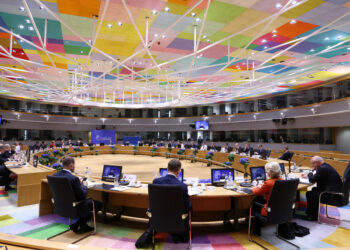Brussels – The arrest warrant issued by the International Criminal Court (ICC) against Benjamin Netanyahu and former Israeli defence minister Yoav Gallant for war crimes and crimes against humanity committed in Gaza risks becoming the swan song of the world order based on respect for multilateral institutions and international law. The decision is already dividing the world, including the 27 EU countries, which are part of the 124 that recognize the authority of the Hague Tribunal.
While Joe Biden has already called the ICC’s decision “outrageous” and Netanyahu has raked up the Dreyfus Affair by accusing The Hague of anti-Semitism, it should be noted that the United States and Israel never ratified the Statute of Rome that established the Court in 2002. From Brussels, the silence of the President of the European Commission, Ursula von der Leyen, and the president of the European Council, Charles Michel, is worrying.

Little use was made of the immediate call by Josep Borrell, EU High Representative for Foreign Affairs, to member countries to implement the mandate.
Viktor Orbán
kicked off the series of reactions from European chancelleries: in his weekly interview on state radio, the Hungarian premier called the International Tribunal’s decision “outrageous” and “brazen.” A political decision “disguised as a legal decision.” Orbán announced that he would invite Netanyahu to visit Hungary, where he would “guarantee that the ICC ruling will have no effect.” An appalling remark? Not really.
Chaos in Italy: Tajani steps in between Salvini and Crosetto
Orbán’s stance paved the way for Italian Vice-Premier Matteo Salvini, who even called the ICC’s mandate “pro-Islamic.” Salvini hopes to “meet with Israeli government officials soon,” adding that “if Netanyahu came to Italy, he would be welcome. The war criminals are others.” A position not agreed upon by either the Farnesina or Palazzo Chigi.
Thus, while Defense Minister Guido Crosetto declared on Porta a Porta that—although he considered the decision wrong—”having joined the International Criminal Court, if Netanyahu and Gallant were to come to Italy, we would have to arrest them,” the Foreign Minister, Antonio Tajani, had to intervene. The other deputy prime minister, after hearing from Giorgia Meloni, cleverly avoided taking a clear position: “We will see what the contents of the decision are and the motivations that prompted this decision,” he said, pointing out on the one hand that “we support the Court” and on the other that the ICC “must play a legal role and not a political one.”
France and Germany stall for time
So far, ambiguity is also at home in Paris and Berlin. From the Quai d’Orsay, headquarters of the French Foreign Ministry, spokesman Christophe Lemoine called the question “legally complex,” thus requiring in-depth analysis. Paris simultaneously recalled “that it has always supported the Court’s action” and stressed that the “fight against impunity” has always been a “priority.” Olaf Scholz’s government plays it safe as well: “We will carefully examine” the measures to be taken, spokesman Steffen Hebestreit said in a note, stressing that “Germany participated in the elaboration of the ICC statute and is one of its major supporters.” He went on to point out that the German position “is also the result of German history, marked by the systematic extermination of Jews under the Nazi regime, and that “as a result”, Germany has “unique relations and a great responsibility with Israel.” Berlin will take “these two conditions” into account in determining its attitude should the two wanted Israelis set foot on its territory.
Who is on the Court’s side: Ireland, Slovenia, the Netherlands, Belgium—and the United Kingdom
On the other hand, there are also those among the 27 who have already reiterated their commitment to abide by the decisions of the International Criminal Court, as required of the signatory countries of the Rome Statute. Starting with Ireland, whose prime minister, Simon Harris, called the arrest warrant an “extremely significant measure,” via the Netherlands, Belgium, and Slovenia, where Premier Robert Golob confirmed that he will “fully respect the decision.”
Norway and the United Kingdom also sided with the ICC. At Downing Street, the prime minister’s spokesman avoided addressing the specific case of Netanyahu’s possible entry into the country. Still, he reiterated that London will always “meet its legal obligations as set out in domestic and international law.”
English version by the Translation Service of Withub









